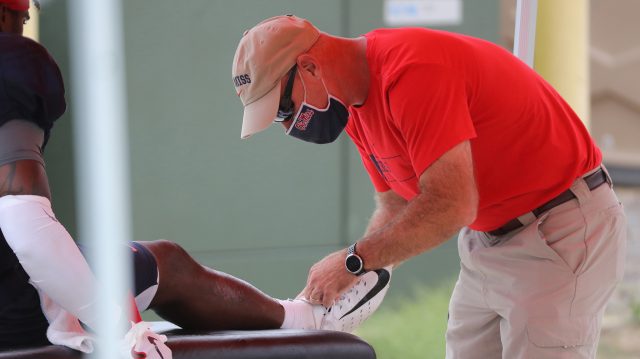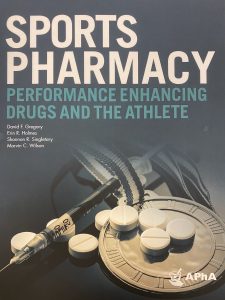
A sports trainer assists an Ole Miss football student-athlete during practice. Faculty members and administrators from the School of Pharmacy and Department of Intercollegiate Athletics have collaborated to produce ‘Sports Pharmacy: Performance Enhancing Drugs and the Athlete,’ the first all-inclusive resource on performance-enhancing drugs. Photo courtesy UM Department of Intercollegiate Athletics
OXFORD, Miss. – After noting the absence of an all-inclusive resource on performance-enhancing drugs, current and former University of Mississippi administrators worked together to publish “Sports Pharmacy: Performance Enhancing Drugs and the Athlete.”
The project was organized and guided by Marvin Wilson, associate dean emeritus for academic and student affairs at the School of Pharmacy. The resulting book provides comprehensive information on banned substances, such as performance-enhancing and illegal drugs, as well as comparative lists of prohibited agents and associated penalties for United States professional, collegiate and amateur athletes in various sports.
“The perceived need for this resource stemmed from the awareness that patients who are athletes and their health care providers need to know these policies to protect the athletes from unintended consequences of prescribed use,” Wilson said. “Often, athletes may need prohibited drugs for legitimate medical conditions, and they and their providers would need to be counseled on how to be proactive in seeking approval for their use.
“If a treatment option could hinder the athlete’s performance, they need to select a different treatment. This book can become an essential resource for such topics.”
Wilson worked closely with Erin Holmes, associate professor of pharmacy administration, and David Gregory, former associate dean of academic affairs at the pharmacy school and dean at Belmont University College of Pharmacy.
Another major part of the book came from Shannon Singletary, senior associate athletics director for health and sports performance in the Ole Miss Department of Intercollegiate Athletics. He addressed drug testing and how it should be conducted, as well as which substances the NCAA allows the schools to provide.
Singletary also wrote on the use of popular supplements, including the data supporting their positive impact and regulations concerning marketing claims.
 The athletics department strives to be a part of the campus’ academia, he said. When Wilson presented the idea to contribute, Singletary said he was excited, as he knew there was no resource like this in sports medicine.
The athletics department strives to be a part of the campus’ academia, he said. When Wilson presented the idea to contribute, Singletary said he was excited, as he knew there was no resource like this in sports medicine.
“I believe this team approach has helped create a great resource that sparks the conversation about the need for health care professionals to understand important rules that must be adhered to when possible in treating elite athletes,” Singletary said.
“Oftentimes, substances can be prescribed to an athlete with an unintended consequence of the athlete being banned. Without sacrificing the quality of care, knowing what questions to ask by having a resource such as this will not only allow providers to treat elite athletes appropriately, but will also prevent dreams such as the Olympics from being dashed by the use of a banned substance.”
Gregory and Wilson authored a detailed chapter on the pharmacology and toxicology of all classes of performance-enhancing drugs, patterned after the prohibited substances list from the World Anti-Doping Agency. This list is the most extensive one in the world and serves as a model for many sporting organizations.
The chapter includes a review of the proposed desired effect on performance and available data to support or refute these claims.
A project two years in the making, the book grew from an elective course that Wilson once taught. The student pharmacists from that class are even acknowledged in the book, as the authors used research from term paper assignments to assist their writing efforts.
“The more we got into research and writing, the more interesting it became,” Wilson said. “This is a great example of a project where athletics and academics teamed up, and we thought it was a good opportunity to get Ole Miss out in front of this growing area.
“As a group, we felt that there is a need for the development of this specialty area of pharmacy practice and that this resource would be beneficial in enhancing this initiative. Such a specialty practice area is recognized internationally, with there being around 6,000 registered sports pharmacists in Japan.”
Along with being one of the most accessible health care providers, pharmacists are best suited for this information because of their expertise, the writing team concluded.
Athletics organizations have changed technical wording of their prohibited lists to include statements such as “chemicals that act like a specifically prohibited substance.” The pharmacological knowledge possessed by a pharmacist would enable such a determination, Wilson said.
“If you own a team and are paying hundreds of millions of dollars each year for that team, you would want to have the best information available that relates to athletes’ abilities to perform, as it might be impacted by legitimate or illicit drugs,” he said.
“We really tried to cover all aspects involving PEDs and supplements, and show why a pharmacist is needed for this role.”
To purchase the book, visit the American Pharmacists Association website at http://pharmacist.org/shop or order by phone at 800-878-0729.